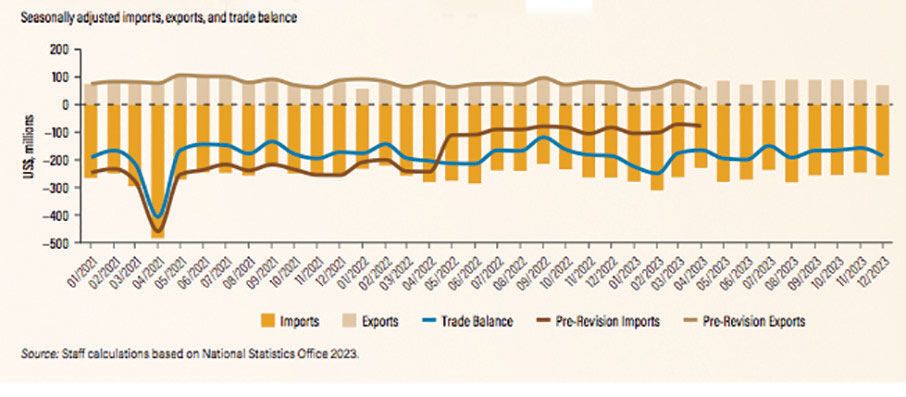Malawi's trade imbalance persists, World Bank says

Source: The Times Group Malawi
Author: William Kumwembe
ELEVATED -- Malawi's imported significantly more than previously assumed
The latest Malawi Economic Monitor (MEM) of the World Bank shows that the country continued facing significant difficulties to pay for imports due to a large, persistent, and increasing trade imbalance and low foreign exchange reserves.
According to the Bretton Woods institution's bi-annual report, interest payments on existing foreign debts make up the bulk of Malawi's primary income deficit.
But the gap is reported to have decreased, albeit marginally, from $1.5 billion in 2022 to $1.3 billion in 2023.
The report says large transfers for both current expenditures and for investment are not able to make up for this imbalance.
"Reducing the amounts of non-essential imports is critical to shrinking Malawi's unsustainable trade imbalance. The recent adjustment of the exchange rate is a key policy tool to achieve this by making imports less affordable and exports more competitive," says the World Bank in the report issued last week.
According to the MEM, Malawi now imports less fuel and fertiliser than in 2022, although the share of these commodities in the total value of imports has been increasing.
Recent revisions of Malawi's trade data show that fertiliser and fuel accounted for 27.1 percent of imported value since the start of 2022, compared to 18.8 percent two years earlier.
However, this still represents 6.1 percent fewer liters of fuel and 30.6 percent fewer bags of fertiliser, reflecting the substantial increase in the cost of both commodities over the past two years.
But fuel and fertiliser imports started increasing again recently as Malawi has imported 2.7 percent more fuel and 66.3 percent more fertiliser by volume in 2023 than in 2022.
Other essential imports, such as medical supplies and pharmaceutical imports continue to experience reductions in import values.
In 2023, according to the report, exports in US dollar terms were 8.3 percent higher than in 2022.
In the year, Malawi's export basket continued to be dominated by tobacco (42.7 percent of total exports), followed by pulses (7.5 percent), and tea (7.3 percent).
Sugar and pulses recorded a particularly strong 2023 export season with both higher prices and volumes.
Meanwhile, macadamia exporters, despite again achieving a double-digit increase in volumes exported, suffered from a sharp global reduction in prices, bringing 2023 export values down relative to 2022. Smaller quantities of groundnuts have been exported officially in 2023 than in 2022, following last year's 99 percent growth in volumes.
Presenting the national budget in Parliament recently, Minister of Finance Simplex Chithyola Banda conceded that Malawi experienced a decline in foreign exchange reserves during the year 2023.
However, he said the economy's foreign exchange reserves improved to 2.7 months of import cover towards the end of December 2023.
"To increase foreign exchange reserves, the RBM will continue to implement the surrender requirement of 30 percent of exports and monitor the performance of the Malawi Kwacha against major trading currencies. With these measures, I wish to assure that the economy's official reserves are expected to improve over the medium term," Chithyola Banda said.
